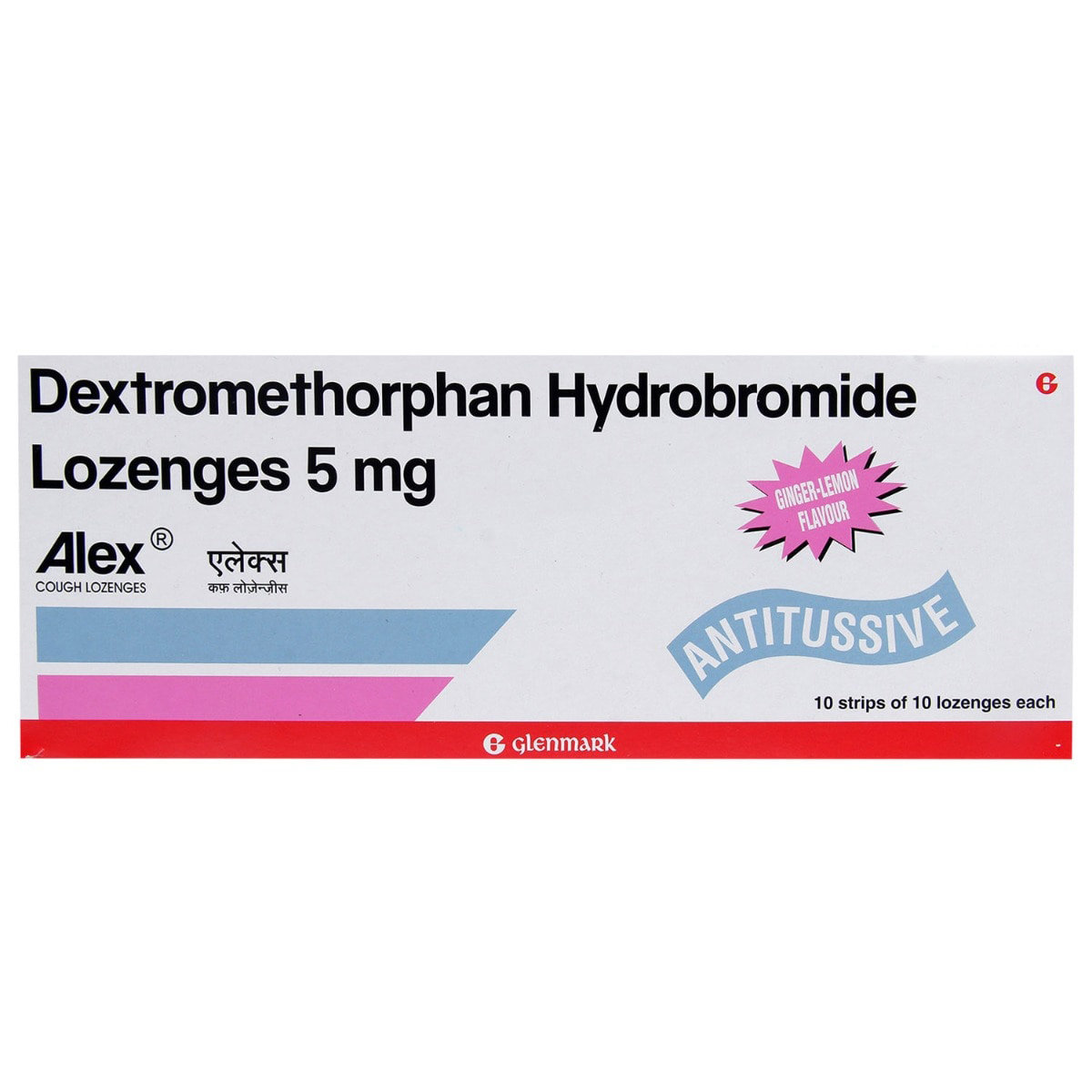Magnatuss DX Ginger-Lemon Lozenges 10's
MRP ₹90
(Inclusive of all Taxes)
₹13.5 Cashback (15%)
Provide Delivery Location
Online payment accepted
 Prescription drug
Prescription drugWhats That
Composition :
Manufacturer/Marketer :
Consume Type :
Expires on or after :
Return Policy :
About Magnatuss DX Ginger-Lemon Lozenges
Magnatuss DX Ginger-Lemon Lozenges contains an anti-tussive (relieve cough) medication primarily used to treat dry cough. A cough is a reflex action that helps to clear any foreign irritant or mucus in the throat.
Magnatuss DX Ginger-Lemon Lozenges contains Dextromethorphan hydrobromide, a cough suppressant. It works by blocking the cough receptor present in the brain, which is known to cause cough.
The most common side effects of Magnatuss DX Ginger-Lemon Lozenges are dizziness, drowsiness, sleepiness, confusion, and nausea. Most of these side effects do not require medical attention and gradually resolve over time. However, if the side effects persist or worsen, please consult your doctor.
If you are pregnant or breastfeeding, please inform your doctor before starting Magnatuss DX Ginger-Lemon Lozenges . Magnatuss DX Ginger-Lemon Lozenges should be given to children only if prescribed by the doctor. Magnatuss DX Ginger-Lemon Lozenges may cause drowsiness, so drive with caution. Let your doctor know if you are taking any prescription/non-prescription drugs or herbal products before starting Magnatuss DX Ginger-Lemon Lozenges .
Uses of Magnatuss DX Ginger-Lemon Lozenges
Directions for Use
Key Benefits
Magnatuss DX Ginger-Lemon Lozenges is primarily used to treat dry cough. Magnatuss DX Ginger-Lemon Lozenges contains Dextromethorphan hydrobromide, a cough suppressant. It works by blocking the cough receptor present in the brain, which is known to cause cough. Magnatuss DX Ginger-Lemon Lozenges is generally prescribed for short-term treatment of dry cough.
Storage
Drug Warnings
Do not take Magnatuss DX Ginger-Lemon Lozenges if you are allergic to any of the contents. If you are pregnant or breastfeeding, please inform your doctor before starting Magnatuss DX Ginger-Lemon Lozenges . If your condition does not improve or you have a recurring cough with fever, rash, please visit the doctor immediately, as this could be serious. Magnatuss DX Ginger-Lemon Lozenges should be taken at least 15 days after the last dose of anti-depressants, especially monoamine oxidase inhibitors (MAO), as taking both together may be fatal.
Drug-Drug Interactions
Drug-Drug Interactions
Login/Sign Up
Co-administration of Magnatuss DX Ginger-Lemon Lozenges and Selegiline may increase the risk of serotonin syndrome (a condition in which a chemical called serotonin builds up in your body).
How to manage the interaction:
Co-administration of Selegiline with Magnatuss DX Ginger-Lemon Lozenges can possibly result in an interaction, but it can be taken if a doctor has advised it. If you notice any of these symptoms - confusion, hallucination, fits, increased heart rate, fever, excessive sweating, shivering, shaking, blurred vision, muscle spasm, stiffness, incoordination, stomach cramps, nausea, vomiting, or diarrhea - make sure to contact a doctor right away. Do not stop using any medications without talking to a doctor.
Taking Tranylcypromine with Magnatuss DX Ginger-Lemon Lozenges can increase the risk of serotonin syndrome (a condition in which a chemical called serotonin increases in your body).
How to manage the interaction:
Taking Magnatuss DX Ginger-Lemon Lozenges with Tranylcypromine is not recommended, but can be taken together if prescribed by a doctor. However, consult a doctor if you experience confusion, hallucination(seeing and hearing things that do not exist), fit blood pressure alteration, increased heart rate, fever, excessive sweating, shivering or shaking, blurred vision, pain in the muscles or stiffness, incoordination, stomach cramps, nausea, vomiting, and diarrhea. Do not discontinue any medications without consulting a doctor.
Co-administration of Phenelzine and Magnatuss DX Ginger-Lemon Lozenges can increase the risk of serotonin syndrome (A condition in which a chemical called serotonin builds up in your body).
How to manage the interaction:
Co-administration of Phenelzine and Magnatuss DX Ginger-Lemon Lozenges can lead to an interaction. However, if you experience any symptoms like confusion, hallucination, seizure, changes in blood pressure, increased heart rate, fever, excessive sweating, shivering or shaking, blurred vision, muscle stiffness, tremors, stomach cramps, nausea, vomiting, and diarrhea, consult a doctor immediately. Do not stop using any medications without a doctor's advice.
Co-administration of Isocarboxazid with Magnatuss DX Ginger-Lemon Lozenges can increase the risk of serotonin syndrome (A condition in which a chemical called serotonin builds up in your body).
How to manage the interaction:
Taking Magnatuss DX Ginger-Lemon Lozenges and Isocarboxazid can lead to an interaction. However, if you experience any symptoms like confusion, hallucination, seizure, changes in blood pressure, increased heart rate, fever, excessive sweating, shivering or shaking, blurred vision, muscle stiffness, tremors, stomach cramps, nausea, vomiting, and diarrhea, consult a doctor immediately. Do not stop using any medications without a doctor's advice.
Co-administration of Pargyline and Magnatuss DX Ginger-Lemon Lozenges can increase the risk of serotonin syndrome (A condition in which a chemical called serotonin builds up in your body).
How to manage the interaction:
Co-administration of Magnatuss DX Ginger-Lemon Lozenges and Pargyline can lead to an interaction. However, if you experience any symptoms like confusion, hallucination, seizure, changes in blood pressure, increased heart rate, fever, excessive sweating, shivering or shaking, blurred vision, muscle stiffness, tremors, stomach cramps, nausea, vomiting, and diarrhea, consult a doctor immediately. Do not stop using any medications without a doctor's advice.
Co-administration of Magnatuss DX Ginger-Lemon Lozenges and Procarbazine may increase the risk of serotonin syndrome (a condition in which a chemical called serotonin builds up in your body).
How to manage the interaction:
Co-administration of Procarbazine with Magnatuss DX Ginger-Lemon Lozenges can possibly result in an interaction, but it can be taken if a doctor has advised it. If you notice any of these symptoms - confusion, hallucination, seizure, increased heart rate, fever, excessive sweating, shivering, shaking, blurred vision, muscle spasm, stiffness, incoordination, stomach cramps, nausea, vomiting, or diarrhea - make sure to contact a doctor right away. Do not stop using any medications without talking to a doctor.
Taking Rasagiline with Magnatuss DX Ginger-Lemon Lozenges can increase the risk of serotonin syndrome (A condition in which a chemical called serotonin increase in your body).
How to manage the interaction:
Taking Magnatuss DX Ginger-Lemon Lozenges with Rasagiline is not recommended as it can possibly result in an interaction, it can be taken if a doctor has advised it. If you notice any of these symptoms like confusion, hallucination, fits, extreme changes in blood pressure, increased heart rate, fever, excessive sweating, shivering or shaking, blurred vision, muscle spasm or stiffness, shaking, incoordination, stomach cramps, nausea, vomiting, and diarrhea, consult a doctor. Do not discontinue any medications without consulting a doctor.
Co-administration of Magnatuss DX Ginger-Lemon Lozenges and Desvenlafaxine might raise serotonin hormone levels in the body and may affect the brain or nerve cells. Increased serotonin hormone can lead to severe side effects.
How to manage the interaction:
Although there is a possible interaction between Magnatuss DX Ginger-Lemon Lozenges and Desvenlafaxine, you can take these medicines together if prescribed by a doctor. However, if you experience symptoms such as seizure (fits), confusion, hallucination, increased heart rate, fever, excessive sweating, shivering or shaking, tremors, incoordination, blurred vision, muscle spasms or stiffness, nausea, vomiting, stomach cramps, and diarrhea, contact a doctor immediately. Do not discontinue the medications without consulting a doctor.
Co-administration of Magnatuss DX Ginger-Lemon Lozenges with Pentazocine can increase the risk of serotonin syndrome (A condition in which a chemical called serotonin builds up in your body).
How to manage the interaction:
Co-administration of Pentazocine with Magnatuss DX Ginger-Lemon Lozenges can possibly result in an interaction, but can be taken together if prescribed by a doctor. However, consult a doctor if you experience confusion, hallucination(seeing and hearing things that do not exist), fits, blood pressure alteration, increased heart rate, fever, excessive sweating, shivering or shaking, blurred vision, pain in the muscles or stiffness, incoordination, stomach cramps, nausea, vomiting, and diarrhea. Do not discontinue any medications without consulting your doctor.
Co-administration of Magnatuss DX Ginger-Lemon Lozenges and Citalopram may increase the risk of serotonin syndrome (A condition in which a chemical called serotonin builds up in your body).
How to manage the interaction:
Although there is a possible interaction between Magnatuss DX Ginger-Lemon Lozenges and Citalopram, you can take these medicines together if prescribed by a doctor. However, if you experience symptoms such as seizures (fits), extreme changes in blood pressure, confusion, hallucination, increased heart rate, fever, excessive sweating, shivering or shaking, tremors, incoordination, blurred vision, muscle spasm or stiffness, nausea, vomiting, stomach cramp, and diarrhea, contact a doctor immediately. Do not discontinue the medications without consulting a doctor.
Drug-Food Interactions
Drug-Food Interactions
Login/Sign Up
Diet & Lifestyle Advise
- Wash your hands with soap and water regularly to prevent the spread of germs.
- Eat plenty of foods rich in good bacteria, like yoghurt, to improve overall health.
- Drink plenty of fluids to avoid dehydration.
- Gargle with salt water for relief from sore throat.
- Do not smoke, as it might worsen your symptoms.
- Avoid alcohol consumption as it may cause tiredness, drowsiness, or lack of concentration.
Side Effects of Magnatuss DX Ginger-Lemon Lozenges
- Dizziness
- Drowsiness
- Diarrhoea
- Sleepiness
- Confusion
- Nausea
Habit Forming
Therapeutic Class
All Substitutes & Brand Comparisons
RX
Alex Cough Ginger Lemon Lozenges 10's
Glenmark Pharmaceuticals Ltd
₹110.5
(₹9.95 per unit)
22% COSTLIER
Author Details
We provide you with authentic, trustworthy and relevant information
Drug-Diseases Interactions
Drug-Diseases Interactions
Login/Sign Up
FAQs
Drug-Drug Interactions Checker List
- ISOCARBOXAZID
- PHENELZINE
- RASAGILINE
- SELEGILINE
- TRANYLCYPROMINE
- AMIODARONE
- PROPAFENONE
- QUINIDINE
- FLECAINIDE
- CODEINE
- TRAMADOL
- MORPHINE
- METHADONE
- FLUOXETINE
- PAROXETINE
- SERTRALINE
- TERBINAFINE
Special Advise
- Do not use dextromethorphan if you have used an MAO inhibitor within the past 14 days. (isocarboxazid, phenelzine, rasagiline, selegiline, tranylcypromine or methylene blue injection).
Disease/Condition Glossary
Dry cough: It is a reflex action that helps to clear any foreign irritant or mucus in the throat. Mostly cough lasts for a short time (two to three weeks), so it is acute. But sometimes, if it is persistent for more than eight weeks, it can lead to chronic cough. The most common causes of cough are cold/flu, asthma, emphysema, and COPD (chronic obstructive pulmonary disease).

Have a query?
Alcohol
Safe if prescribed
Avoid consumption of alcohol with Magnatuss DX Ginger-Lemon Lozenges as it may cause increased drowsiness. Please consult a doctor before consuming alcohol with Magnatuss DX Ginger-Lemon Lozenges .
Pregnancy
Consult your doctor
Magnatuss DX Ginger-Lemon Lozenges belongs to pregnancy category C. Its safety in pregnancy is unknown, so it should be taken only if prescribed by a doctor.
Breast Feeding
Consult your doctor
The safety of Magnatuss DX Ginger-Lemon Lozenges in breastfeeding women is unknown, so it should be taken only if prescribed by a doctor.
Driving
Safe if prescribed
Magnatuss DX Ginger-Lemon Lozenges may cause drowsiness or tiredness in some people. Therefore, drive only if you are alert after taking Magnatuss DX Ginger-Lemon Lozenges .
Liver
Consult your doctor
Take Magnatuss DX Ginger-Lemon Lozenges with caution, especially if you have a history of liver disease. The dose may be adjusted by your doctor as required.
Kidney
Consult your doctor
Take Magnatuss DX Ginger-Lemon Lozenges with caution, especially if you have a history of kidney disease. The dose may be adjusted by your doctor as required.
Children
Safe if prescribed
Magnatuss DX Ginger-Lemon Lozenges is not recommended for children below the age of 4. Magnatuss DX Ginger-Lemon Lozenges should be given to children only if prescribed by a child specialist.






_0.jpg?tr=q-85)

